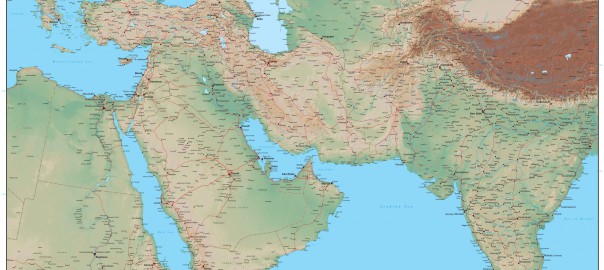No one should be surprised by the conflict in the Middle East. Neither should anyone expect a military or diplomatic solution to the problem.
The origin of the conflict and a solution to it are stated in Genesis, the first book of the Old Testament. It is therefore to God and His written Word that we should turn for both an understanding of the circumstances in the Middle East and our response to them.
Abram and Sarai’s decision to veer from God’s plan and temporarily “go their own way” resulted in prophesy that has impacted the world since the birth of Ishmael. God clearly promised Abraham a son and descendants as numerous as the dust of the earth and the stars in the sky (Genesis 13:15-16; 15:4-5). At the time of that promise, Abram (later called Abraham – the father of many nations (Genesis 17:5)) was married to one wife – Sarai (later renamed Sarah (Genesis 17:15)). Their expectation should have been that God would fulfill His promise of a son through their union. But they became impatient and decided that they should “help God” produce an heir. So Sarai suggested Abram take her servant Hagar as his wife and have a child through Hagar. Ishmael was soon thereafter born of Hagar (God gave them what they wanted), but Sarai despised both Hagar and Ishmael. Abram, of course, loved this son he had fathered, even though he was not the son of promise; and God had mercy on a father’s heart, assuring Abram that Ishmael would also be a great nation (in fact producing twelve nations) (Genesis 17:20; 21:13, 18; 25:12-16 ).
Even though God blessed Ishmael with continued life and descendants, God did not plan for Ishmael to be the son of promise. This destiny was reserved for Isaac who was later born of Sarah (Genesis 17:21; 18:14; 21:1-2, 12). (God keeps His promises – in His timing!) God’s prophesies regarding Ishmael’s character tell us that the descendants of Ishmael’s twelve nations will be hostile toward one another (Genesis 16:12). Ishmael’s conduct toward his half-brother Isaac also gives us a foretaste of the enmity that Ishmael’s descendents will feel toward Isaac’s descendants (the nation of Israel), mocking the chosen nation of God and the One who is God’s chosen Messiah (Genesis 21:9).
What do you observe in the Middle East today? You see hostility of Arab nations and Muslim factions toward one another. And you see hostility toward Israel, God’s chosen people. This is a direct manifestation of God’s prophesy recorded in Genesis 16:12, which says, “He [Ishmael] will be a wild donkey of a man; his hand will be against everyone and everyone’s hand against him, and he will live in hostility toward all his brothers.” (The fulfillment of this prophecy by Ishmael’s descendants is confirmed in Genesis 25:18.)
Despite the fact that this hostility is prophesied, God did not leave us without recourse. The solution to those hostilities is also prophesied in Genesis.
In Genesis 12:2-3, God says to Abram, “2‘I will make you into a great nation and I will bless you; I will make your name great and you will be a blessing. 3aI will bless those who bless you, and whoever curses you I will curse; 3band all peoples on earth will be blessed through you.'”
The latter part of verse 3 (here referenced as 3b) is a prophesy of the Savior, Jesus Christ, who would be a descendent of Abraham and his son of promise Isaac. God passed on the promise of blessing to Isaac’s son Jacob, the younger of twin boys born to Isaac’s wife Rebekah. Jacob, renamed Israel by the LORD (Genesis 32:28), in turn received the promise, and became the father of twelve sons – the twelve tribes of Israel (Genesis 35:23-26). It is through Jacob’s fourth son, Judah, that the lineage of the promised Messiah (Jesus) was prophesied and fulfilled (see Matthew 1:1-17; Luke 3:23-33).
Through His death on the cross, Jesus, as the sinless Lamb of God (John 1:29), bore the punishment deserved by both the chosen nation of Israel and all Gentile nations, including the descendants of Ishmael. People throughout history who believe that Christ took the sin punishment on their behalf receive peace from the Prince of Peace (Isaiah 9:6) and the promise of eternal life. Even though Ishmael’s descendants may feel “rejected” that they are not descended from the son of promise, they, like all Gentile nations, are actually offered the gift of salvation through faith in Christ Jesus. Through this gift believers are adopted into the family of God (I John 3:1) and become joint heirs of the promises of Christ: “…through the gospel the Gentiles are heirs together with Israel, members together of one body, and sharers together in the promise of Jesus Christ” (Ephesians 3:6).
Our personal response to the Middle East conflict should be to receive the salvation offered by Jesus Christ’s redemptive work on the cross and to share the good news of this salvation with Gentiles throughout the world – including Arab/Muslim nations. Now is “the time of the Gentiles” (Romans 11:25) to be told about and receive salvation from the life-changing Prince of Peace. Only as the love and peace of Christ enters the hearts of Muslims (and all men) will hostility cease.
In Genesis 12:2-3a God declares that Abraham will be a blessing and the nation that blesses Abraham will be blessed. As individuals, we should personally thank God for making Abraham a blessing to the world through Christ, honor God’s chosen people (Israelites worldwide), and share the gospel with Abraham and Ishmael’s descendants.
Military force can never change the hearts of men. But the redemptive love of the Savior can.


